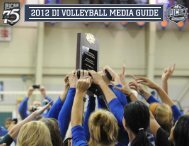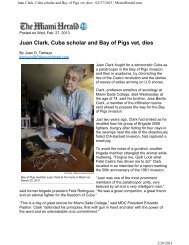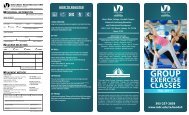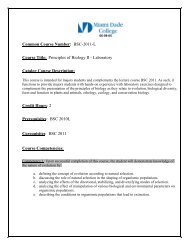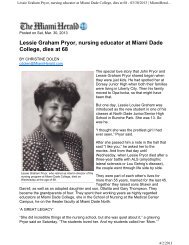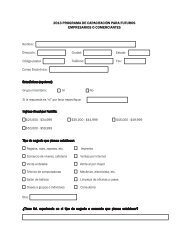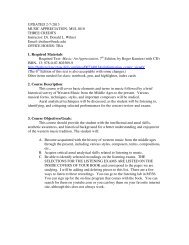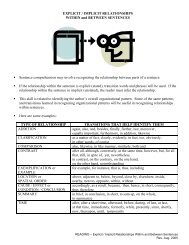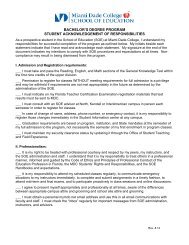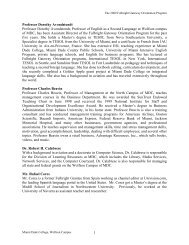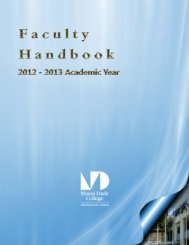Catalog 2010-2012 - Miami Dade College
Catalog 2010-2012 - Miami Dade College
Catalog 2010-2012 - Miami Dade College
You also want an ePaper? Increase the reach of your titles
YUMPU automatically turns print PDFs into web optimized ePapers that Google loves.
GRADUATION<br />
4 6<br />
eign language. A student taking course<br />
work to fulfill the foreign language<br />
requirement must earn at least a C or<br />
better in at least 2 courses (8-10 credit<br />
hours) of sequential foreign language at<br />
the secondary level or the equivalent<br />
of such instruction at the postsecondary<br />
level. Native speakers of another<br />
language and other students who wish<br />
to demonstrate proficiency by means<br />
other than course work should consult<br />
the ESL/Foreign Language Department<br />
for testing. <strong>Miami</strong> <strong>Dade</strong> <strong>College</strong> will<br />
accept American Sign Language<br />
(ASL) through SPA 2614C and SPA<br />
2615C (American Sign Language 3<br />
and 4) for the foreign language<br />
requirement.<br />
Associate in Science/ Associate<br />
of Applied Science Degrees<br />
The Associate in Science degree is<br />
awarded to students who successfully<br />
complete one of the occupational, education<br />
or allied health programs. These<br />
areas of study are designed primarily<br />
to prepare students for immediate<br />
employment. However, credits earned<br />
for many courses in these programs are<br />
acceptable to upper-division colleges<br />
should the student decide to continue<br />
toward a four-year degree. To be granted<br />
upper-division standing at a Florida<br />
public institution, the student must<br />
meet the admissions criteria, including<br />
successful completion of the <strong>College</strong><br />
Level Academic Skills (CLAS) or stateapproved<br />
alternative criteria.<br />
Requirements for Associate<br />
in Science/Associate of<br />
Applied Science Degrees<br />
1. Complete an approved program<br />
with 60 or more credits specified in<br />
courses numbered 1000-2999, including<br />
the general education core courses.<br />
2. Earn a minimum 2.0 GPA in the 60<br />
or more program credits presented for<br />
graduation.<br />
3. Complete the general education<br />
courses with a minimum of a C grade.<br />
General Education and<br />
<strong>Miami</strong> <strong>Dade</strong> <strong>College</strong> Student<br />
Learning Outcomes<br />
General Education:<br />
Student Learning<br />
Outcome Foundation<br />
Academic study has its foundation<br />
in the required courses and designated<br />
elective areas of general education.<br />
Through this coursework, the student<br />
begins the acquisition of fundamental<br />
knowledge, skills and attitudes. What<br />
begins in specified general education<br />
coursework is reinforced and expanded<br />
through the general and intentional<br />
presence of Student Learning Outcomes<br />
throughout each student’s degree program<br />
and cocurricular learning.<br />
Student Learning Outcomes:<br />
A Promise between<br />
Students and Faculty<br />
All students who graduate from MDC<br />
– regardless of major or degree type –<br />
have 10 things in common: the collegewide<br />
student learning outcomes summarized<br />
below. Developed after many<br />
conversations with students, faculty,<br />
alumni and members of the business<br />
community, the outcomes are part of all<br />
programs regardless of major or degree<br />
type. They will assist you to succeed<br />
in your chosen field, to strengthen the<br />
life skills critical to your future, and to<br />
become a lifelong learner.<br />
1. Communications – Knowing what<br />
you’ve learned doesn’t mean much<br />
if you can’t express it. All students<br />
should be able to communicate<br />
well.<br />
2. Quantitative Analysis – Numbers<br />
are everywhere – from the calories<br />
in your favorite soda to political<br />
polls. All students should be able to<br />
process, understand and accurately<br />
analyze numerical data.<br />
3. Critical/Creative Thinking and<br />
Scientific Reasoning – There’s no<br />
guarantee that you’ll know all the<br />
answers by the time you graduate,<br />
but you will develop the skills to<br />
W W W . M D C . E D U<br />
think through a situation and arrive<br />
at a logical conclusion.<br />
4. Information Literacy – Why are<br />
there concerns about Wikipedia<br />
as an acceptable research tool? By<br />
the time you graduate, you’ll know<br />
the pros and cons of using Internet<br />
resources and be able to locate relevant<br />
and accurate information<br />
resources.<br />
5. Global, Cultural and Historical<br />
Perspectives – Thanks to the World<br />
Wide Web and telecommunication,<br />
we are aware of many ways of life<br />
across the world. In order to succeed<br />
in this global society, students<br />
need to develop an appreciation of<br />
various cultures and an understanding<br />
of different points of view.<br />
6. Personal, Civic and Social<br />
Responsibility – While at MDC,<br />
you’ll develop skills to fulfill not<br />
only your personal responsibilities,<br />
but also your roles as citizens and<br />
members of a global community.<br />
For example, John Donne said, “No<br />
man is an island.” Everything you<br />
do and say has an impact on those<br />
around you.<br />
7. Ethical Thinking – Prevalent<br />
among newspaper headlines from<br />
the past ten years are terms like<br />
“Stem Cell Research,” “Cheating<br />
in High School,” and “Euthanasia.”<br />
Your course of study will help you<br />
develop strategies and values in ethical<br />
thinking to help you understand<br />
these and other controversial issues.<br />
8. Computer and Technology<br />
Usage – You can probably surf the<br />
net and send e-mails already, but<br />
there are many other powerful tools<br />
at your fingertips. Before you graduate,<br />
you will learn how to use word<br />
processing, spreadsheets, databases<br />
and presentation programs as well.<br />
9. A e s t h e t i c A p p r e c i a t i o n –<br />
Appreciating the creative process<br />
is an essential part of being a wellrounded<br />
individual.<br />
10. N a t u r a l S y s t e m s a n d t h e<br />
Environment – What exactly is<br />
trans fat? Is tap water a pure substance<br />
or a mixture? How does carbon<br />
dioxide affect our atmosphere?<br />
An understanding of natural systems<br />
is important in caring for your<br />
health and the world around you.



